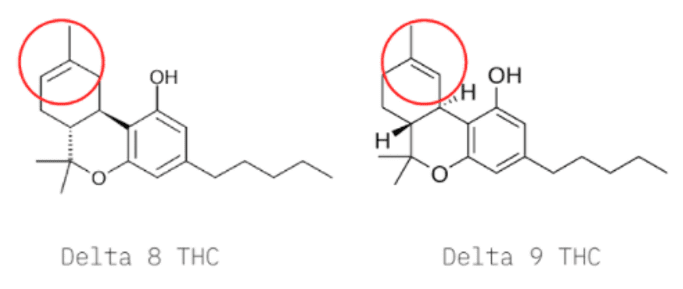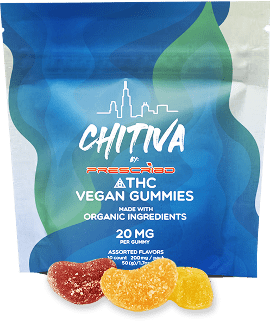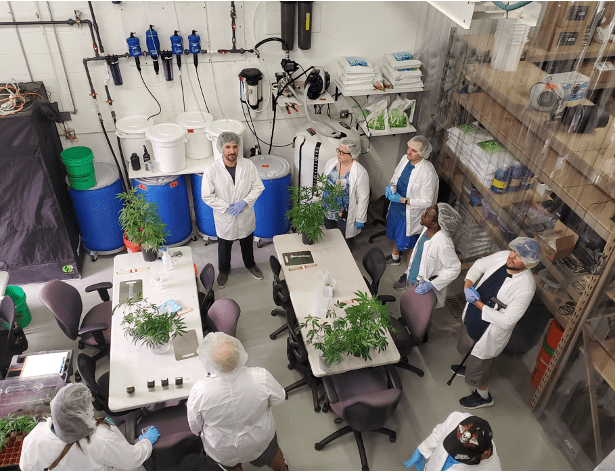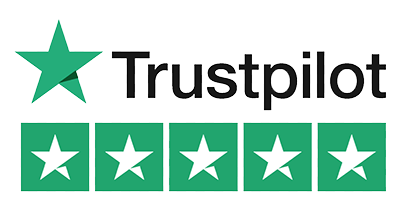You may not have heard of delta-8 before. Or, maybe you’ve heard of this new “synthetic” cannabinoid, but focused on all the bad things being highlighted in the news.
Delta 8, like many other of the 60+ cannabinoids such as CBD, THC, CBG, and CBN, is a naturally occurring compound found in Cannabis Sativa. Currently, it is being converted from CBD extracted from hemp plants.
In this article, we will cut through all the confusion and deliver the details you need to know about delta 8 THC. We will discuss where delta 8 comes from, how it is used, and how it will make you feel.
What is delta 8 THC?
Delta 8 is a type of Tetrahydrocannabinol (THC), the psychoactive property of cannabis, and is very similar in molecular structure to “Standard,” or Delta 9 THC, the cannabinoid most associate with “getting high.”
You might wonder why they’d bother — isn’t Delta-8 the same as Delta-9?
Not completely. Think of the two as cousins, or even siblings. The official term is “analogue.” Visually, Delta-8’s double molecular bond sits on the carbon chain one step earlier than Delta-9’s does. This seems like a very small difference, but it does affect the potency of the psychoactive result. Most manufacturers claim their Delta-8 products to be about 60% as potent as Delta-9. This difference can be significant to consumers who are very sensitive to THC and prefer a less-potent option.
Consumers might find that Delta-8 doesn’t cause some of the negative sensations of stronger THC, such as paranoia, headaches, or sleepiness. Another benefit is what’s known as the entourage effect, the idea that combining Delta-8 with aromatic terpenes and other cannabinoids like CBN results in a synergistic sensation that cannot be obtained on a single compound alone. This synergy can result in increased creativity and concentration and is what many users hope for when using THC of any kind.
There aren’t enough scientific studies performed to fully understand how the effects of Delta 8 compare to those of Delta 9 THC, the commonly known form of THC. Based on anecdotal testimonials, it appears that Delta 8 creates more of a body buss vs. the head high commonly associated with conventional Delta 9 THC, leading to a classification more commonly known as “diet weed.”
Is Delta-8 Legal?
The molecular difference between the 8 and 9 versions of THC is small in appearance but big in terms of regulation and legalization. In short, Delta-8 benefits from the Farm Bill of 2018 an action that opened the door for hemp products containing less than 3% Delta-9 THC. The Farm Bill affected the power of the Federal Analogue Act, which held that all forms of THC are illegal and should be regulated.
Is Delta-8 Legal in my State?
In short, Delta-8 benefits from the Farm Bill of 2018, an action that opened the door for cannabis products containing less than 0.3% Delta-9 to be classified as industrial hemp.
Comparing the Chemical Structure of Delta 8 vs. Delta 9 THC
Although Delta-8 isn’t directly mentioned in the Farm Bill, since it is currently derived from industrial hemp, many have interpreted that it is legal because it simply isn’t Delta-9, which is the current threshold used by regulators for differentiating industrial hemp from marijuana. Certain states, such as Michigan, have enacted laws to prevent the sale of Delta-8 in gas stations and head shops, due to lobbying from marijuana licensees concerned about protecting the value of their marijuana licenses. Other States, such as Florida, have moved in the opposite direction by establishing a legal framework for regulated delta-8 sales. There is currently an ongoing discussion in the State of Illinois about establishing a framework for regulated delta-8 sales.
Is Delta-8 Safe?
The safety of Delta-8 is a concern because, in order to make the “8” version of TCH, a synthetic process takes place.
To make Delta-8, a manufacturer might add a combination of CBD and Delta-9 THC, or just CBD alone, to a solvent and follow up with an acid. This mixture is heated and stirred for many hours to cause the chemical reaction that creates Delta-8. The exact solvent and acid used in processing aren’t regulated, so manufacturers take their own approaches. This is where you should hold caution: It’s possible the less ethical cannabis providers could use dangerous compounds like heavy metals, toluene, heptane, or dichloromethane. Even if the process uses safe and common chemicals, the clean-up of byproducts may be improper, leaving traces of possibly hazardous materials in the Delta-8.
While these worries are valid, consumers should consider that other cannabis products and pharmaceuticals in general often undergo similar or much more complex chemical synthesizing. Delta-8 is in some ways a victim of a controversy that should extend to all unregulated hemp processing. Take some peace in knowing that cannabis manufacturers are often under the watchful eye of their state governments and have every motivation to protect their licenses. For that reason, many of them take the time to develop safe Delta-8 and even pay for third-party testing that proves their Delta-8 is completely clean of toxic ingredients.
Where can you find delta 8 THC?
Delta 8 THC is naturally found in cannabis, but like many of the more less-known cannabinoids, delta 8 is currently only present in small concentrations in the plant.
Research and Development have begun to breed cannabis plants that naturally contain high concentrations of delta 8, but it will likely be some time before plants with delta 8 THC concentrations comparable to CBD or delta 8 THC become commonly available.
Today, the majority of the delta 8 THC on the market is created by converting either CBD or CBG through a process called isomerization. Isomerization is a chemical process in which a molecule is transformed through a catalyst into something with a different structure.
The basic conversion process from CBD to delta 8 THC is simple and can be accomplished with a basic understanding of high school chemistry. It can be performed as simply as
- Mixing and gradually heating CBD crude oil with reagent, such as T41 bleaching clay, in a distillation kit. This is generally done in a slow, deliberate and even manner until the mixture reaches 205* C
- Separating and filtering the elements of the mixture to extract the delta 8 from the mixture
- Testing the delta 8 extract to ensure that byproducts and contaminants have been properly removed
But Isn’t Synthetic Bad?
The best way to understand the “supposed dangers” of synthetics is to understand the history of analogous plant-based medicines. Since ancient times, humans have chewed on the bark of a willow tree to relieve pain. Later on, it was discovered that willow bark contained salicin, a compound that the human body can metabolize to create salicylic acid, a natural pain reliever.
However, most find the act of chewing on tree bark to be cumbersome and somewhat uncivilized, and while people began “naturally” extracting salicylic acid from willow bark in the 1800s, the use of naturally extracted salicylic acid for pain relief did not reach widespread adoption due to the side effects associated with its use (it burned throats and upset stomachs). Then, in the late 19th century, Felix Hoffman, a German chemist working at Bayer Pharmaceutics, discovered an “artificial” method of “isomerizing” salicylic acid, that produced acetylsalicylic acid, the active ingredient of aspirin.
In the case of delta 8 THC, properly manufactured, delta 8 is a beneficial cannabinoid that provides many of the benefits of THC without the headaches or paranoia commonly associated with delta 9 THC.
The exact solvent and acid used in manufacturing delta 8 aren’t regulators, so manufacturers can use their own approaches. As is the case with all new and developing industries, there are manufacturers that may use dangerous or inferior processes.
Is Delta-8 for You?
If you are interested in trying Delta-8, first find a reputable source. Look for a manufacturer that specializes in Delta-8 products and offers third-party testing reports. These reports, which might be available on the manufacturer’s website or through your clinic or dispensary, will list common compounds of the cannabis extraction, processing, and distillation process alongside hemp compounds like THCs, CBD, and minor cannabinoids. Ideally, a report will show that your Delta-8 product is clean and identical to the Delta-8 that grows naturally in the plant.
However, always keep in mind that Delta-8 processing emerges from the hands of manufacturers that might change their process post-testing or just get sloppy with quality control. If you’re still curious about Delta 8, have your wellness specialist help you make the purchase. And, of course, start with a small dose and work your way up accordingly!
Ready to Try Delta-8?
Are you ready to give Delta-8 a try? Compassionate Clinics of America has partnered with Prescribd a minority-owned social equity producer of CBD, Delta-8, and other Cannabis products that have been licensed as a grower and processor under the State of Illinois Industrial Hemp Pilot Program since 2019. Our team recently had that opportunity to tour their facility, and sample the products. When it comes to selecting partners we seek only the very best.
They operate Total Holistic Care (THC) by Chitiva, a walk-in farm-to-table educational facility, and store in Bridgeview, IL, where they provide demonstrations on how they grow, process, manufacture, and finish a variety of cannabis products. Sign up for an indoor grow tour.
They were recently profiled by the Chicago Tribune and If you are interested in learning more about or trying out Delta-8, we are pleased to offer a free 10-pack sample of their delta-8 infused vegan and organically made gummies for anyone willing to stop by the store or by visiting Compassionate Clinics office on Wednesdays 9 am -5 pm throughout September. To receive your free Delta-8 gummy sample, click on the link to register to receive your coupon for in-person pickup. You can claim your coupon by clicking on the link:




